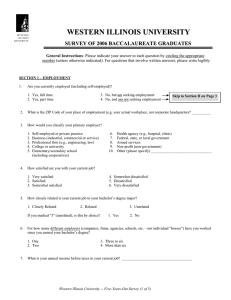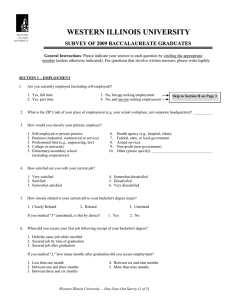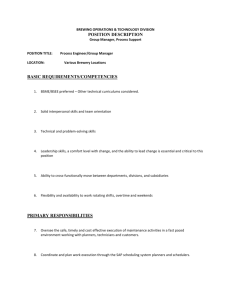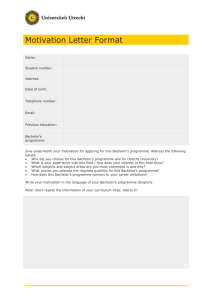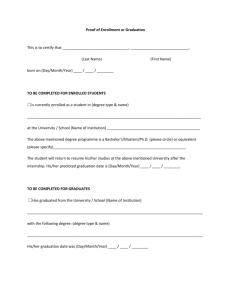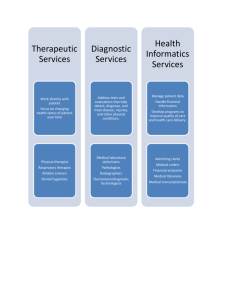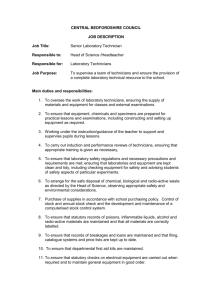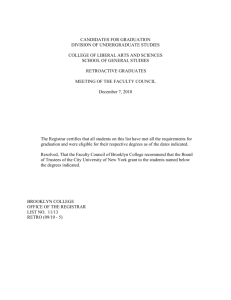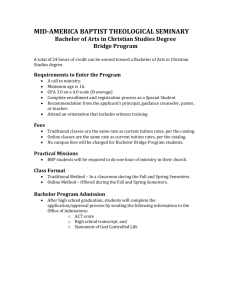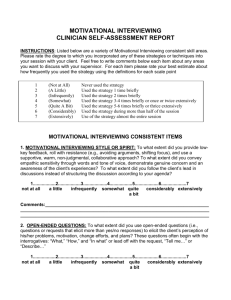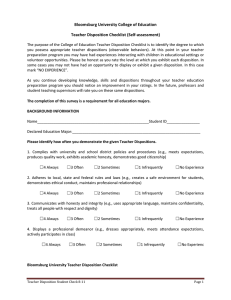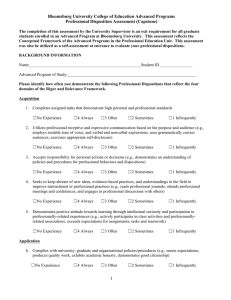COMMON SURVEY QUESTIONS - Eastern Illinois University
advertisement
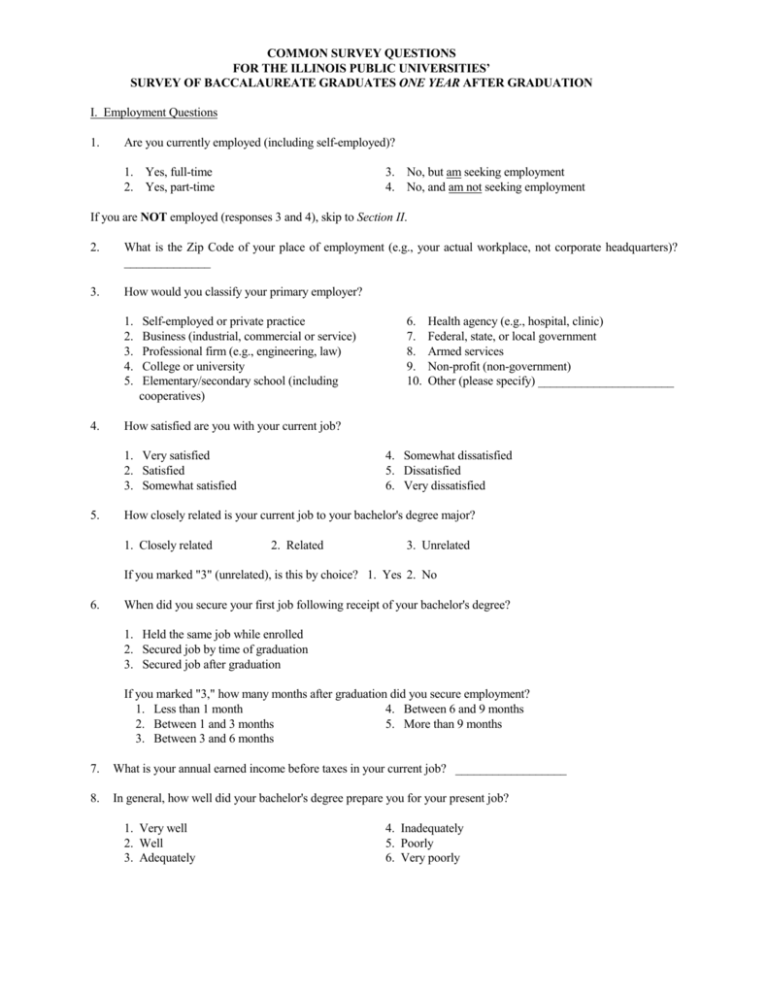
COMMON SURVEY QUESTIONS FOR THE ILLINOIS PUBLIC UNIVERSITIES’ SURVEY OF BACCALAUREATE GRADUATES ONE YEAR AFTER GRADUATION I. Employment Questions 1. Are you currently employed (including self-employed)? 1. Yes, full-time 2. Yes, part-time 3. No, but am seeking employment 4. No, and am not seeking employment If you are NOT employed (responses 3 and 4), skip to Section II. 2. What is the Zip Code of your place of employment (e.g., your actual workplace, not corporate headquarters)? ______________ 3. How would you classify your primary employer? 1. 2. 3. 4. 5. 4. Self-employed or private practice Business (industrial, commercial or service) Professional firm (e.g., engineering, law) College or university Elementary/secondary school (including cooperatives) Health agency (e.g., hospital, clinic) Federal, state, or local government Armed services Non-profit (non-government) Other (please specify) ______________________ How satisfied are you with your current job? 1. Very satisfied 2. Satisfied 3. Somewhat satisfied 5. 6. 7. 8. 9. 10. 4. Somewhat dissatisfied 5. Dissatisfied 6. Very dissatisfied How closely related is your current job to your bachelor's degree major? 1. Closely related 2. Related 3. Unrelated If you marked "3" (unrelated), is this by choice? 1. Yes 2. No 6. When did you secure your first job following receipt of your bachelor's degree? 1. Held the same job while enrolled 2. Secured job by time of graduation 3. Secured job after graduation If you marked "3," how many months after graduation did you secure employment? 1. Less than 1 month 4. Between 6 and 9 months 2. Between 1 and 3 months 5. More than 9 months 3. Between 3 and 6 months 7. What is your annual earned income before taxes in your current job? __________________ 8. In general, how well did your bachelor's degree prepare you for your present job? 1. Very well 2. Well 3. Adequately 4. Inadequately 5. Poorly 6. Very poorly 9. Please indicate on the list below your primary occupation. This listing is intended for students one, five, and nine years after graduation. For some occupations, such as doctors, the occupation is not appropriate for students one year after earning a baccalaureate degree. 1. Management (such as top executives; marketing, P.R., finance, human resources, administrative services, purchasing, & sales managers; educational administrators; health administrators) 2. Business Operations (such as buyers & purchasing agents; insurance claims adjusters/examiners; human resources, training, & labor relations specialists; management analysts) 3. Financial Specialists (such as accountants, assessors, appraisers, financial & credit analysts/advisors, loan counselors/officers) 4. Computer Specialists (such as computer & information scientists, programmers, software specialists, database & network administrators and analysts) 5. Mathematical Scientists and Technicians (such as mathematicians, statisticians, actuaries & mathematical technicians) 6. Architects, Surveyors, and Cartographers 7. Engineers and Related Technicians (such as agricultural, civil, computer hardware, electrical, industrial, mechanical, materials & construction engineers & technicians) 8. Life and Physical Scientists and Technicians (such as agricultural & food scientists, biologists, medical scientists, chemists, physicists, atmospheric & environmental scientists, and related technicians) 9. Social Scientists (such as economists, psychologists, market & survey researchers, geographers, historians, sociologists, anthropologists, political scientists & urban planners) 10. Health: Doctors (such as physicians & surgeons, dentists, veterinarians, optometrists, podiatrists, and chiropractors) 11. Health: Registered Nurses 12. Health: Therapists (such as occupational, physical, recreational, and speech therapists) 13. Health: Other Health Practitioners, Professionals, and Support Workers (such as pharmacists, dieticians, physician assistants, and all other technicians/assistants/aides) 14. Community and Social Service (such as counselors, social workers, community & religious workers, probation officers) 15. Legal: Attorneys/Judges 16. Legal: Legal Support Workers 17. Education : Early Childhood Teachers (such as day care, pre-school, and kindergarten teachers) 18. Education: Elementary School Teachers 19. Education: Middle School Teachers 20. Education: Secondary School Teachers 21. Education: Special Education Teachers 22. Education: Other, except Administrators (see #1 above) such as postsecondary teachers; vocational teachers; teaching & research assistants; other teachers, trainers, & assistants) 23. Library Occupations (such as librarians, archivists, curators, and library technicians) 24. Arts and Design Workers (such as designers and fine & craft artists) 25. Entertainers, Performers, Sports and Related Workers (such as musicians, singers, dancers, actors, producers, directors, composers, athletes, coaches and referees) 26. Media and Communication Workers (such as writers & editors, announcers, news analysts & reporters, public relations specialists, and media & communications equipment workers) 27. Sales (such as real estate, retail, insurance & securities sales agents, wholesale & manufacturing sales representatives, telemarketers) 28. Office and Administration (such as clerical & support personnel, clerks, tellers, distribution workers) 29. Protective Services (such as firefighters, correctional officers, police, life guards, security guards, investigators) 30. Food Preparation and Serving (such as cooks, bartenders, food service workers & servers) 31. Building and Grounds Cleaning and Maintenance (such as janitors, cleaners, landscaping & groundskeeping laborers) 32. Personal Care and Services (such as flight attendants, child care workers, hairstylists & personal care workers, recreation workers, hotel & travel industry workers) 33. Farming, Fishing, and Forestry (such as farmworkers, animal care workers, foresters, loggers) 34. Construction and Extractive (such as carpenters; electricians; painters, construction, oil & mining workers; plumbers) 35. Installation, Maintenance, and Repair (such as telecommunications workers; auto repairers; heating, air conditioning, and refrigeration mechanics and installers) 36. Production (such as electrical & electronic equipment assemblers; food, metal, plastic, printing, & photography industry technicians & workers) 37. Transportation and Material Moving (such as pilots, drivers, air traffic controllers) 38. Military (such as officers & enlisted personnel) II. Education Questions 10. Have you enrolled in a college or university since earning your bachelor's degree? 1. Yes, full-time 2. Yes, part-time 3. No If you have NOT enrolled in a college or university (response "3"), skip to Section III. 11. Are you pursuing (or have you completed) an additional degree since earning your bachelor's? 1. Yes 2. No (If your answer is “no,” skip to Section III.) If you are pursuing (or have completed) another degree, please indicate which degree below: 1. Associate's 2. Second Bachelor's 3. Academic Master's (MA, MS, MEd, etc.) 4. Professional Master's (MBA, MSW, MFA, MPA, etc.) or Education Specialist 5. Medicine (MD, DO) 12. 6. Health Professional (dentistry, pharmacy, podiatry, optometry, etc.) 7. Theology/Divinity 8. Law (LLB, JD) 9. Doctorate (PhD, EdD, DA, DBA, etc.) 10. Other, please specify:________________________ In general, how well did your bachelor's degree prepare you for your additional degree program? 1. Very well 2. Well 3. Adequately 4. Inadequately 5. Poorly 6. Very poorly III. Satisfaction Questions 13. What is your present attitude towards the University (Campus)? 1. Strongly positive 2. Positive 3. Somewhat positive 14. 4. Somewhat negative 5. Negative 6. Strongly negative What is your present attitude towards your bachelor's degree major? 1. Strongly positive 2. Positive 3. Somewhat positive 4. Somewhat negative 5. Negative 6. Strongly negative IV. Educational Practices Questions: The questions below will provide feedback to help the University improve undergraduate education. Please respond to each question by evaluating your program as a whole. 15. In my major degree program, professors were accessible outside of class. Very often Often Sometimes Infrequently Never 16. In my major degree program, I was expected or required to work cooperatively with other students on projects, homework, and assignments. Very often Often Sometimes Infrequently Never 17. In my major degree program, professors encouraged me to challenge my own ideas, the ideas of other students, and those presented in readings and other course materials. Very often Often Sometimes Infrequently Never 18. In my major degree program, professors used appropriate teaching activities to help me learn. Very often Often Sometimes Infrequently Never For those institutions who would like questions for all 7 of Chickering’s Principles of Good Practice, here are the additional questions: 19. In my major degree program, professors’ expectations for the quality of student work was high. Very often Often Sometimes Infrequently Never 20. In my major degree program, professors provided me with timely feedback on my performance. Very often Often Sometimes Infrequently Never 21. In my major degree program, professors emphasized that studying and planning were important to my academic success. Very often Often Sometimes Infrequently Never
